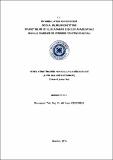DSpace Repository
YEREL YÖNETİMLERİN YOKSULLUKLA MÜCADELESİ (EYÜP BELEDİYESİ ÖRNEĞİ)
JavaScript is disabled for your browser. Some features of this site may not work without it.
| dc.contributor.author | Mutlu, Gülden
|
|
| dc.date.accessioned | 2019-05-13T07:08:53Z | |
| dc.date.available | 2019-05-13T07:08:53Z | |
| dc.date.issued | 2014 | |
| dc.identifier.uri | http://hdl.handle.net/11547/1876 | |
| dc.description.abstract | Dünya ölçeğinde sanayi devrimi ile başlayan kent yoksulluğu olgusu Türkiye'de 1950'li yıllardan itibaren varlığını hissettirmeye başlar. 1950'lerden itibaren kırsal alandan kente yönelen göç ve kent içinde yaşanan yatay sosyal hareketlilik, beraberinde sosyal, ekonomik ve endüstriyel bir dönüşüm sürecini başlatmıştır. Bu dönüşüm sürecinde, özellikle sanayileşmenin çok önünde bir hızla seyreden kentleşme nedeniyle kentlerde hızla artan işsizlik, diğer taraftan emek yoğun sektörden, önce sermaye yoğun sektöre, sonra da bilgi yoğun sektöre doğru yaşanan geçiş sürecinde gerekli uyumu sağlayamadığı için iş imkanı bulamayan bireylerin normal yaşam standartlarından mahrum kalmaları sonucu doğmuştur. Bu dönüşümün yarattığı nitelikli iş gücü taleplerini kendi imkânları ile kendilerini geliştirerek karşılamak imkanından yoksun olan kent yoksulları hayatlarını idame ettirmek için ya kayıt dışı istihdamın objesi olmuşlar ya da bu sorunlarını enformel sektörler aracılığı ile çözmeye çalışmışlardır. Küreselleşme ile derinleşen ve keskinleşen kentsel yoksulluk olgusu ile mücadele etme zorunluluğu her şeyden önce "sosyal devlet" ilkesinin doğurduğu anayasal bir zorunluluktur. Başlangıçta merkezi yönetimin görev alanında yer alan yoksullukla mücadele günümüzde belediyelerin de temel fonksiyonlarından biri haline gelmiştir. 1973 yerel seçimlerinden sonra üç büyük şehirde belediye başkanlıklarını kazanan CHP'li belediye başkanlarının uygulamaları ile başlayan toplumcu belediyecilik tartışmaları ve kent yoksulluğu ile mücadele edilmesi gerekliliğine vurgu yapan sosyal belediyecilik, 2004 belediye reformunun da önemli taleplerinden biridir. Kent yoksulluğu ile mücadele etmeyi daha önce kendiliğinden yerine getiren belediyeler 2004 reformu sonrasında bu mücadelenin temel paydaşlarından biri haline gelmiştir. Bu çalışmada 2004 belediye reformu sonrasında kent yoksulluğu ile mücadele konusunda belediyelerin yetkileri tanımlanarak Eyüp Belediyesi'nin kent yoksulluğu ile mücadele çerçevesinde ortaya koyduğu politikalar değerlendirilmiştir. | tr_TR |
| dc.language.iso | tr | tr_TR |
| dc.publisher | İSTANBUL AYDIN ÜNİVERSİTESİ SOSYAL BİLİMLER ENSTİTÜSÜ | tr_TR |
| dc.subject | Yoksulluk | tr_TR |
| dc.subject | Kent yoksulluğu | tr_TR |
| dc.subject | Sosyal belediyecilik | tr_TR |
| dc.subject | Yoksullukla mücadele | tr_TR |
| dc.subject | Poverty | tr_TR |
| dc.subject | Urban poverty | tr_TR |
| dc.subject | Social Civic | tr_TR |
| dc.subject | To fight poverty | tr_TR |
| dc.title | YEREL YÖNETİMLERİN YOKSULLUKLA MÜCADELESİ (EYÜP BELEDİYESİ ÖRNEĞİ) | tr_TR |
| dc.type | Thesis | tr_TR |
| dc.description.abstractol | Turkey began with the industrial revolution world-wide phenomenon of urban poverty begins to make its presence felt in the 1950’s. Migration from rural areas towards the city from the 1950’s, and the horizontal social mobility in the city, along with the social, economic, and started the process of industrial transformation. This conversion process, especially in urban areas due to urbanization, industrialization too fast in front of the rapidly rising unemployment, the labor-intensive sector, on the other hand, the capital -intensive sector, then in the process of transition towards a knowledge-intensive industry can not find jobs for failing to provide the necessary adaptation of individuals deprived of a normal standard of living result of being born. This is caused by the transformation of skilled manpower to meet the demands of improving themselves through their own efforts to sustain the lives of the urban poor who lack the ability or became the object of informal employment, or attempted to solve these problems through informal sectors. With the phenomenon of globalization, the fight against urban poverty deepening and sharpening first and foremost obligation to the "welfare state " principle engendered a constitutional necessity. Initially, the task of the central government in the field of fight against poverty today has become one of the primary functions of municipalities. After the 1973 local elections, the CHP won mayoral positions in three major cities of socialist mayors, municipal applications, starting with the emphasis on the need to combat urban poverty debates and social municipality, the municipal reform of 2004 is one of the important demands. To combat poverty in the city earlier this struggle, self- fulfilling municipalities after the reform of 2004 has become one of the main stakeholders. In this study, after the reform of 2004 the municipal authorities of municipalities in the fight against urban poverty, defined within the framework of the fight against urban poverty revealed by Eyüp Municipality policies are evaluated. | tr_TR |
| dc.publisher.firstpagenumber | 1 | tr_TR |
| dc.publisher.lastpagenumber | 93 | tr_TR |
Files in this item
This item appears in the following Collection(s)
-
Tezler -- Thesis [3470]
